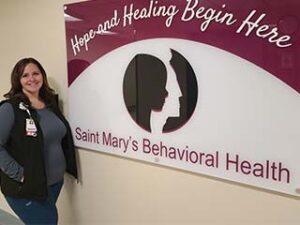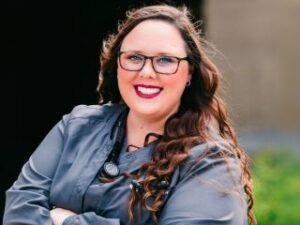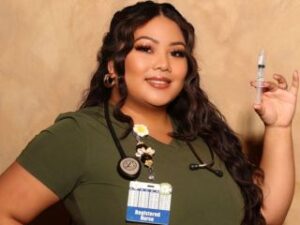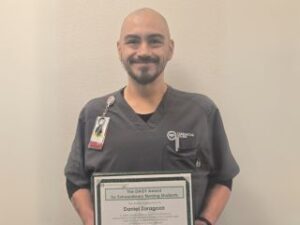 Bree Peterson wanted to care for others at a young age; she was a volunteer firefighter and EMT from age 16 to 21 and had a job doing ambulance work. These experiences helped her realize that she wanted to someday pursue a career in the medical field. Later, while working as a waitress, fate brought her toward her true career path: She waited on a customer who happened to be an instructor from Carrington College. They began talking about the Medical Assisting program, and the instructor invited her to campus to find out more. Soon after, Bree enrolled in the program and graduated as an MA. Years later, she returned to Carrington College to enroll in the Registered Nursing program, standing out as a great student and president of the student council. She graduated in 2020. Bree now works as a New Graduate at St. Mary’s hospital. Here, she tells us more about her experiences at Carrington College and in her career.
Bree Peterson wanted to care for others at a young age; she was a volunteer firefighter and EMT from age 16 to 21 and had a job doing ambulance work. These experiences helped her realize that she wanted to someday pursue a career in the medical field. Later, while working as a waitress, fate brought her toward her true career path: She waited on a customer who happened to be an instructor from Carrington College. They began talking about the Medical Assisting program, and the instructor invited her to campus to find out more. Soon after, Bree enrolled in the program and graduated as an MA. Years later, she returned to Carrington College to enroll in the Registered Nursing program, standing out as a great student and president of the student council. She graduated in 2020. Bree now works as a New Graduate at St. Mary’s hospital. Here, she tells us more about her experiences at Carrington College and in her career.
Can you give us an overview of your experience as an MA?
I did the Medical Assisting program and graduated from Carrington College in 2010, then worked as an MA and Lab Tech for Renown Hospital for a few months. I then worked for a private GI doctor for two and a half years, and as an MA in urgent care and women’s health for St. Mary’s.
What led you to go back to Carrington College to become an RN?
I always wanted to do more. I really enjoyed school. My husband had been pushing me for years to go back for my RN, the office I loved was closing, and I didn’t know if I wanted to do MA again. I went down to Carrington and got into the program on my first attempt—it was just the right time and right place.
How was your student experience at Carrington College?
With the MA program it was different—I didn’t have a ton of family support at the time, it was just me and my mom, but I made it work. The RN program was more difficult; it was challenging. I had to keep remembering the reasons why I was doing it to stay motivated and focused. When I was student council president, I told students, “Write down why you want to do this, what inspires you. Is it family? Is it a moment? Focus on why you want it or who you want to be as a nurse.”
Did you have any challenges during school that you had to overcome?
Juggling everything with family while being in school was a challenge. It’s a different dynamic, it had been a long time since I had been in school. I was learning how to get back in the swing of school, learning how to manage my time, get enough sleep, see my family, or even just eat! It’s a lot of time management. That was the most difficult thing for me.
Did you ever want to quit while you were in school?
Yes! It’s so hard. There were moments when I questioned whether I could do this. I let myself be frustrated and sad and then remember my why: for my family and kids, to see me achieve my dreams, to make a difference. I want to look back on think that one of my patients could remember me as that nurse that made such a difference for them.
Is there an instructor or staff member that you’d like to acknowledge?
Professor Meyer, the Anatomy & Physiology 1 and 2 Instructor. She is hands down the most difficult teacher I’ve ever had; I’ve never met someone who would pound theories into your head like she did, I still remember her words and the information she taught us. She was just incredible. She pushed us as hard as she could—but we knew if we got through her class, we could do anything!
Please tell us about your current job.
I work at St. Mary’s Hospital. I’m currently transitional to practice in the new graduate program, and I work for the in-person acute psychiatric unit. I wanted to be at St. Mary’s; it’s very competitive, so I applied for every unit, but I had a specific interest in psychiatric care. I wanted to know more about it. I have gotten a lot of exposure to things I’d never had experience with. I was recently nominated for a Daisy award, which was a huge honor (the Daisy Award is given from the Daisy Foundation, an organization that honors nurses internationally in memory of Patrick J. Barnes. The award honors, “…the super-human work nurses do for patients and families every day wherever they practice, in whatever role they serve and throughout their careers.”). I received the award because I helped a patient who had fallen, and I was on the ground calming and comforting her. [Hospital stays] are very hard on our psychiatric patients. The biggest thing you can do is support them. I’m also using new nurse knowledge on other floors, such as medical surgical for post-op recovery, and I go to medical floors and ER help w psych patients there. Some RNs also float to pediatrics.
What do you enjoy most about your work?
What I enjoy most is making a difference. It’s making a difference for patients who didn’t think there could be a difference. I met a patient who was in pain for 11 years; I suggested something new to the doctor, who agreed to try it, and for the first time in years she had relief. Knowing I helped her was such a great feeling.
What do you find most challenging about your work?
Psychiatric nursing is a different style of nursing; you don’t get to see a wound heal or have the gratification of “seeing” the physical progress. Not seeing that can be a struggle. Some patients come in psychotic, and some leave psychotic or with mental health deficits. There is an emotional side of it, and sometimes it’s hard to relate with other new nurses.
How has the COVID-19 pandemic affected your duties?
It does affect my job; the unit is secluded, and it’s hard. Mental health is so much about the connections you make with your patients, seeing them where they are at, and helping them get through their crisis. It’s hard to connect with them in a mask and being six feet across the room. We all have learned how to adapt to this, and though connection is a factor, right now I don’t know much different. Geriatric psychiatric patients may not know there is a pandemic, and they may not understand why you are wearing a mask. You can’t hold their hand to encourage them. That’s hard.
What advice do you have for students in school now?
Understand that it’s okay to not ace every test, and it’s okay to not do okay on a test. I graduated on the dean’s list for MA program, and I was so hard on myself when that didn’t happen at RN. Being perfect on every assignment sometimes isn’t possible. I think in the RN program you have to see that you will sort of be broken down and built back up; it really did help me become a better nurse, I’m humbled and honored and proud, I had to bust my butt, and failure is a part of it. It’s important to be humbled.



